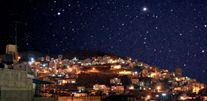We Saw His Star in the East…

From 18th-25th January 2022 Churches Together are encouraging us to join with the Week of Prayer for Christian Unity. Each day we will be sharing their resources so watch this space!
Introduction
The story of the Magi visiting the Holy Family in Bethlehem is one very familiar to us. Indeed, we have recently celebrated Christmas; the Feast of Incarnation and Epiphany. The Magi have sometimes been seen as a symbol of the world’s diversity – different religions and cultures – that comes to pay homage to the Christ-child. The story might therefore represent the unity of all created that God desires. The Magi travel from far-off countries, and represent diverse cultures, yet they are driven by the same hunger to see and know the new-born king and are gathered into the little house in Bethlehem in the simple act of giving homage. In this we can find a metaphor for Christian unity: that is, of different Christian peoples drawn together in their common search to recognise Christ, to know him and to worship him and witnessing to wider need for unity and to overcome injustice.
This text has been chosen by the churches of the Middle East, the history of which was, and still is, characterized by conflict and strife, tainted with blood and darkened by injustice and oppression. Since the Palestinian Nakba (the exodus of Palestine’s Arab population during the 1948 war) the region has seen a series of bloody wars and revolutions and the rise of Islamic extremism. The story of the Magi also contains many dark elements, most particularly Herod’s despotic orders to massacre all the children around Bethlehem who were two years old or under (Matt 2:16-18). The cruelty of these narratives resonates with the long history and difficult present of the Middle East.
It was in the Middle East that the Word of God took root and bore fruit: thirty and sixty and one hundredfold. And it was from this East that the apostles set out to preach the Gospel to the ends of the earth (Acts 1:8). The Middle East has given thousands of Christian witnesses and thousands of Christian martyrs. And yet now, the very existence of the small Christian community is threatened as many are driven to seek a more secure and prosperous life elsewhere. Like the light which is the child Jesus, the light of Middle Eastern Christianity is increasingly threatened in these difficult times.
Jerusalem is a powerful symbol for Christians because it is “The City of Peace”, where all humanity was saved and redeemed. But today peace is missing from the city. Even prayer in Jerusalem has become subject to political and military measures. Various parties stake their claim to it and disregard others. Jerusalem was the city of kings, indeed the city that Jesus will enter triumphantly, acclaimed as king (Lk 19:28-44). Naturally the Magi expected to find the new-born king revealed by the star in this royal city. However, the narrative tells us that, rather than being blessed by the birth of the Saviour king, the whole of Jerusalem was in tumult, much as it is today. Today, more than ever, the Middle East needs a heavenly light to accompany the people.
In this context Christians are called to seek the new-born king, the king of gentleness, peace and love. But where is the star that leads the way to him? It is the mission of the Church to be the star that lights the way to Christ who is the light of the world. By word and through action the Christian people are called to light the way so that Christ might be revealed, once again, to the nations. Yet divisions dim the light of Christian witness and obscure the way, preventing others from finding their way to Christ. Conversely, Christians united in their worship of Christ, and opening their treasures in an exchange of gifts, become a sign of the unity that God desires for all of creation.
The Covid-19 global pandemic; the economic crisis that has followed and the failure of political, economic and social structures to protect the weakest and most vulnerable; and the racism that blights our communities have underlined the global need for a light to shine in the darkness. The star that shone in the East, (the Middle East), two thousand years ago still leads us to the manger, to where Christ was born. It draws us to where the Spirit of God is alive and active.
After encountering the Saviour and worshipping him together, the Magi return to their countries by a different way, having been warned in a dream. The communion we share in our prayer together must inspire us to return to ourselves, our churches and our world by new ways. But what does this mean in practice? Serving the Gospel today requires a commitment to humankind, especially the poorest, the weakest and those marginalized. It requires from the churches transparency and accountability in dealing with the world, and with each other. This means churches need to cooperate to provide relief to the afflicted, to welcome the displaced, to relieve the burdened, and to build a just and honest society. This is a call for churches to work together so that we can all build a good future according to God’s heart, a future in which all human beings can experience life, peace, justice, and love.
Original source: WPCU 2022
